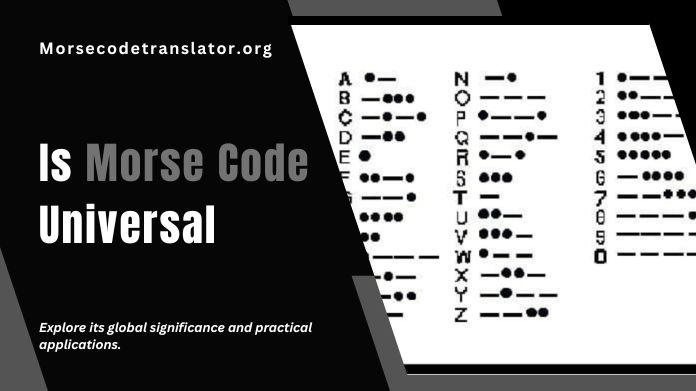Morse Code, a time-honored method of communication through sequences of dots and dashes, has a fascinating history that transcends borders and technological eras.
As we delve into the question, “Is Morse Code Universal – How It Works,” we embark on a journey to unravel the intricacies of this symbolic language. Originating in the early 19th century with Samuel Morse and Alfred Vail, the Morse Code was a revolutionary means of long-distance communication.
In this Morse Code Translator exploration, we uncover the mechanics of Morse Code’s works and delve into the intriguing query of its universality. Join us as we decode the dots and dashes, tracing the evolution of Morse Code from its telegraph origins to its enduring presence in various domains, and explore whether its simplicity and efficiency make it a universal language of communication.
How is Morse Code Universal?

The ability of Morse code to encode languages with its signals and make them more versatile for communication makes it a universal language.
For use with the telegraph, a ground-breaking invention that many other nations soon sought to emulate, Morse code was developed. Non-English-speaking nations even went so far as to establish their telegraph codes or modify the original codes to fit their language.
That is precisely what a German guy did, and the result was the earliest version of the International Morse Code, which worked better with a broader range of languages.
Because English and other languages share Latin, it can be used with slight modification. China and Japan, on the other hand, whose languages are more complicated, had to develop more inventive ways to hide their numerous symbols.
For Morse code to function, characters in a language must be assigned combinations of a short signal, known as a “dot,” and a more extended signal, known as a “dash.”
This implies that every letter in Morse has a distinct mix of these signals and the required numbers, punctuation, and special characters.
In International Morse Code, for instance, the character “A” is denoted by (• ─), the character “7” by (─ ─ ─ • •), and the character “comma” by (─ • • ─ ─).
Using Morse code, you can communicate in a variety of languages in the following ways:
- A radio pulses with sound.
- Signal lights that flash
- Blinking your eyes, tapping your hands or feet
Application of Morse Code Universal
While modern communication technology has largely replaced Morse Code in everyday use, there are still some applications where it proves helpful:
1. Emergency Signals: Morse Code is still used in emergencies, like signaling for help using lights or sounds.
2. Backup Communication: The Morse Code is a backup way to communicate in some aviation and maritime situations when other methods might not work.
3. Ham Radio: Morse Code is popular among ham radio enthusiasts as an efficient communication method, especially in challenging conditions.
4. Military Use: Morse Code has a history in the military and may still be used for secure communication in some cases.
5. Learning and Education: People learn Morse Code for survival skills and historical knowledge.
6. Preserving History: Museums and enthusiasts keep Morse Code alive to preserve the history of communication.
7. Message Encoding: Morse Code can encode messages, providing a simple form of encryption.
8. Accessibility: Some people with disabilities use Morse Code for communication, making it more accessible.
Conclusion
Morse Code universal is in the sense that every culture uses it in daily communication; its simplicity and versatility have made it a widely recognized and historically significant encoding system.
Initially developed for telegraphy, Morse Code has applications in emergency signaling, aviation, maritime communication, amateur radio, and military contexts.
Its use has evolved, and while it may not be as prevalent in mainstream communication today, Morse Code plays a role in various niche applications and historical preservation efforts and is a skill learned for emergency preparedness.
The enduring legacy of the Morse Code lies in its adaptability and its status as a symbol of the evolution of communication technologies.
